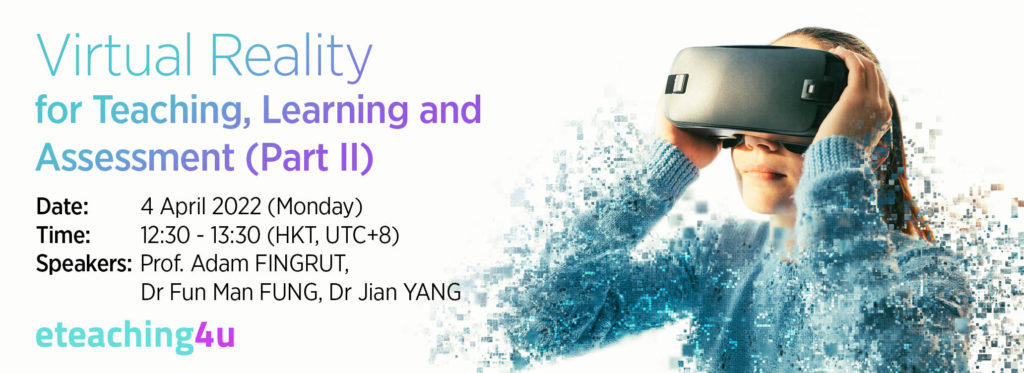
Virtual Reality for Teaching, Learning and Assessment (Part II)
- 4 April 2022 (Monday)
- 12:30 - 13:30 (HKT, UTC+8)
- Prof. Adam FINGRUT, Dr Fun Man FUNG, Dr Jian YANG
Webinar Video
With the increasing digitisation of classrooms, there is constant interest to adopt emergent technologies into teaching and learning. Virtual reality (VR) is one of the new technologies that piqued the interest of educators around the world with the promise to create new learning experiences. It is seen as a valuable tool to create immersive environments and provide a student-centered learning experience through interactions.
While the benefits of AR are apparent, widespread adoption of this technology remains a work in progress. There are many practical issues and concerns yet to be addressed, such as ease of use, scalability and comparative effectiveness. As such, steps taken by pioneers in adopting VR would be insightful for mindful educators.
In this webinar we have invited professional educators from different institutions to share their experience in using VR technology in their classes. In particular, our guest speakers will cover the following topics:
- Practical VR & AR in studio-based learning for architectural design
- Using web-based VR for crime scene investigation studies
- Large-scale VR adoption in medical anatomy classes
Facilitators
Prof. Adam FINGRUT is an Assistant Professor and researcher in architecture at the Chinese University of Hong Kong (CUHK), with a teaching and research focus on computation, fabrication, and construction systems. Adam’s research focuses on understanding how new technology can innovate design, fabrication, and construction methods in architecture, channeled through publications, articles, workshops, installations, and creative construction works such as the Yard of Environmental Sustainability (YES) and the ZCB Bamboo Pavilion. He is also the Co-Director of the Centre of Robotic Construction and Architecture (CRCA) at CUHK, a collaborative research platform with the Department of Mechanical and Automation Engineering (MAE), which explores the use of advanced design and robotics for innovative architecture.
Dr. Fun Man FUNG devotes his time to learning and development via innovative digital technology. His current research interest lies at the intersection of learning sciences and technology, and his research projects are organized under the themes of digital media, learning community, game-based learning and active learning. His op-eds are published in The Straits Times, Channel News Asia, The Conversation and World Economic Forum. He is the recipient of multiple teaching awards and currently serves on the editorial advisory board of the ACS Journal of Chemical Education. He co-edited two books for Chemistry Education and has authored and co-authored 32 peer-reviewed publications.
Dr. Jian YANG graduated from Peking University Health Science Center and went on to pursue a PhD in neuroscience at University of Bristol. He joined the Department of Anatomy, the University of Hong Kong after graduation in 2007, and devoted his passion to anatomy and histology education since 2012. He is now a senior lecturer in the School of Biomedical Sciences, LKS Faculty of Medicine, HKU. His teaching expertise include gross anatomy, neuroanatomy, histology and problem-based learning. He dedicates his effort in converting instructional anatomy and histology classes into indispensable active-learning experience. His research focuses on integrating digital/mobile technology to enhance active learning in anatomy and histology labs. The current projects include creating a digital learning environment, peer-learning and peer-support system for gross anatomy and histology practicals; developing virtual reality anatomy lab and integrating VR-enriched tasks (VRETs) into gross anatomy classroom to promote active learning.
Acknowledgement
This webinar is supported by:
– UGC Special Grant for Strategic Development of Virtual Teaching and Learning – Inter-institutional Collaborative Activities Projects
– IEEE Education Week
– IEEE Region 10 Education Activities Committee
– IEEE Hong Kong Section Education Chapter
